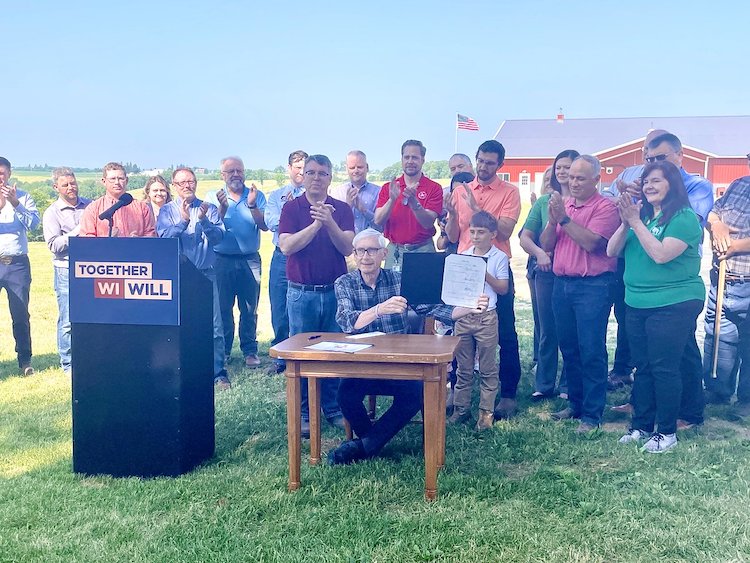
The State Senate, the State Assembly, and the State Governor all agreed — Wisconsin’s rural roads need additional funding. The support was so strong that Senate Bill 247 passed both the Senate and the Assembly via a unanimous vote on June 15. Less than a week later, Governor Tony Evers signed the $150 million funding measure into law and Senate Bill 247 has now become Wisconsin Act 13.
“The quality of our local roads, bridges, and highways is critical to the success of our farmers, their families, and our state’s economy,” stated Governor Tony Evers in signing the bill into law at Hamburg Hills Farm in Stoddard, Wis., on June 21. “By improving agricultural roads across our state, we’re helping ensure our agricultural industries can get product to market, keep food on grocery store shelves and on our tables, and support rural communities and economies. This bill is great news for farmers and folks across our state, and I’m grateful for the bipartisan work to get this done this session.”
In the State Senate, Senator Howard Marklein was a co-sponsor for the bill and did some heavy lifting as did State Senators Cory Tomczyk (R-Mosinee) and Joan Ballweg (R-Markesan). “The funding in ARIP is targeted to the first-mile roads and bridges that farmers use very day,” Marklein said of the ARIP bill more formally known as Agricultural Roads Improvement Program. “These are the small, Class B and weight-restricted roads that connect our farms to county and state highways. Unfortunately, many of these roads are in awful condition and our small towns need financial support to maintain and improve them. This program fills the need,” said the Republican state senator who lives near Spring Green, Wis.
“This is a wise investment of the one-time funds in our state surplus,” Marklein continued. “This bill is widely supported by the entire ag industry.”
As far as the mechanicals are concerned, the ARIP will be administered under the Local Roads Improvement Program (LRIP).
What is a Class B road?
In Wisconsin, Class B roads are rural, country roads on which many farms are located. Farmers, and their suppliers, must navigate these roads to move goods to and from the farm. Unfortunately, for most towns, these are low-traffic, low-priority roads, but they are very important to the farmers who live and work on them. The goal of the program is to repair these roads and small bridges so they will no longer be weight restricted. According to Marklein, the ARIP bill includes prioritization criteria to ensure money is used most efficiently.
A contentious issue in two Wisconsin counties
This roads issue was brought to the forefront by several Hoard’s Dairyman Intels that garnered over 10,000 views. The issue began to make headlines when Price County threatened to stop milk trucks from moving down its roads. Just days later, cooler heads prevailed as a solution was developed: “Milk trucks roll: Price County grants waivers.”
However, the situation returned to a boil the very next year when Chippewa County looked to limit milk trucks. While opinions varied on the situation, milk truck haulers firmly objected to the Chippewa County decision.
In the ensuing months, the Chippewa County Board of Supervisors brought the matter back up for discussion at its March County board meeting as a deep debate took place on milk hauling regulations. As a result, the Chippewa County Highway Committee, the Chippewa County Board of Supervisors, and the Chippewa County Highway Commissioner walked back a rather short-lived $100 permit fee for milk haulers.
As these debates were taking place within Chippewa County, Hoard’s Dairyman asked two larger questions:
There’s an answer!
Now that Senate bill 247 has been signed into law, work can be done on important rural roads. “We prioritize projects that increase access to the largest number of farmers, are located on the oldest roads, lead to the largest reduction in deferred or repeated trips, have the greatest economic impact, target roads where the only feasible access to a farm is a single road, and provide funding to towns that cannot otherwise afford to maintain or repair these roads,” said Marklein.
This bill will not fix all the road woes in Wisconsin. However, it’s a major start.
“We acknowledge that we are not going to be able to fix all 62,000 miles of town road at once, but there are some roads that make a lot of sense to invest in, and the way we decided to go about identifying those roads are roads that have a significant amount of economic activity,” said Travis Tranel, an assembly Republican from Cuba City, Wis., who co-authored the bill with Marklein. Representative Nancy VanderMeer also worked extensively on the measure.
A strong response from agriculture
Well over 20 agricultural organizations from the Wisconsin Ag Coalition supported Senate Bill 247. This went a long way toward gaining the unanimous passage in both the state’s Assembly and the Senate.
“Improvements to agricultural infrastructure are long overdue here in Wisconsin,” said Kevin Krentz, president of the Wisconsin Farm Bureau Federation. “The historic funding of $150 million will start to modernize rural infrastructure by directing grant funds to roads supporting our global supply chain,” said the Wisconsin dairy farmer.
“Rural road improvements are essential for the stability and strength of Wisconsin’s dairy processing businesses and the entire food supply chain — from farm to table,” added Rebekah Sweeney, senior director of programs and policy for the Wisconsin Cheese Makers Association.








